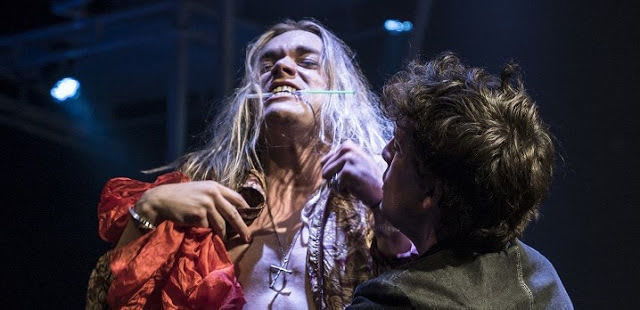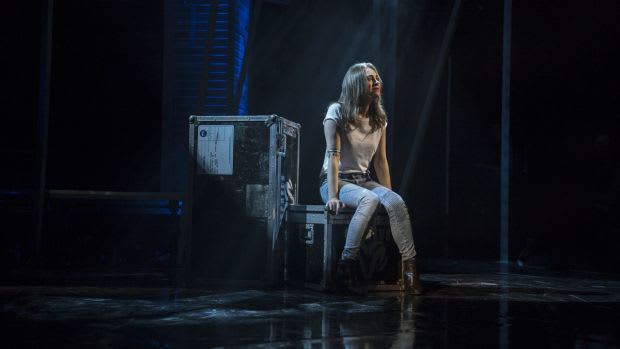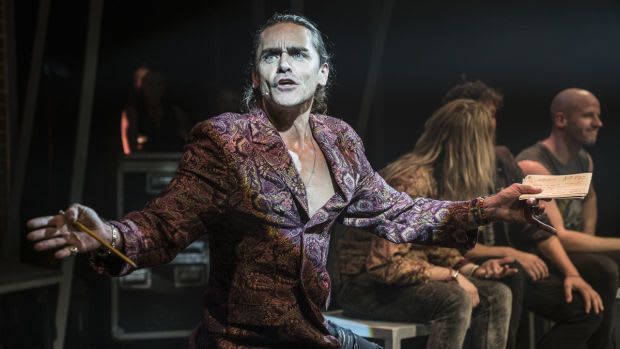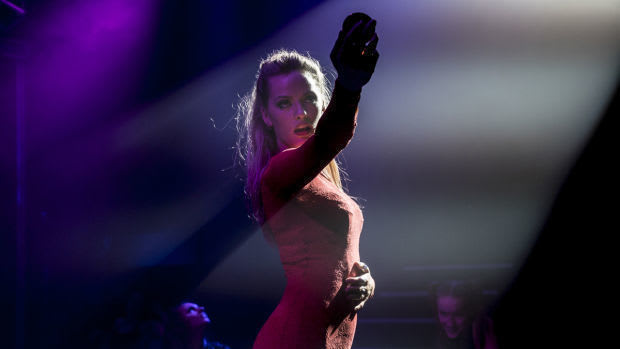Jimmy and his mates are a rock band that is going nowhere until, after taking the stage name of Orpheus, he meets mysterious Ms M on the Underground. She’s a talent scout who sends him to record label Olympus where he is offered a deal by the head of the company whose name is Hades.
That’s the Orpheus story plus a pact straight out of Faustus (you can see where this is going already). The band call themselves The Argonauts (complete with Jason). From the start, three strange women seem to control things, looking down on a writhing humanity. They’re the Fates (the classical Moirai), though at first they seem more like Macbeth’s prophetic witches. At one point, someone mentions the Gorgon Medusa, but I never worked out which character she was. There are quotes from Macbeth and from Hamlet soliloquies too: it’s quite a mixture, and sometimes a muddle.
This isn’t so much a reworking of old stories as a borrowing from them; though Orpheus does go down into the Underworld (literally) events there follow a new pattern. The show’s title 27, for those to whom it may be a mystery, refers to the music press idea of a Club 27, that succession of rock stars—Brian Jones, Janis Joplin, Jimmy Hendrix, Jim Morrison and Kurt Cobain plus Amy Whitehouse—who all died at that age. Orpheus seems next in the roll call, along with his devoted girl friend who isn’t called Eurydice but Amy.
It is played on a thrust stage that designer Nick Eve backs with an angular, jutting structure that echoes the sharp shafts of his lighting that flashes over bare chests, torn lacy tights and leather. Most of the numbers are belted out and the face microphones and amplification of the sound design make following lyrics and dialogue a challenge. Sam Cassidy may know his own lyrics but doesn’t he want his audience to understand them? But then the plot seems very schematic, character development non-existent, so perhaps we don’t need to hear them.
The Cockpit is an in-the-round theatre designed to facilitate close communication with the audience but, despite some action in the aisles that leans towards intimacy, this production seems conceived on rock concert lines more suited to a large arena. It’s the sound and not the content that seems to matter.
With Arlene Phillips co-directing alongside Sam Cassidy, the choreography at least should be in safe hands but it is credited to Ryan-Lee Seager and Lucy Martin and, though lively to the point of being frenetic, it is disappointing. Its jerking limbs, flailing hair and contrived abandon are delivered with energy but what is meant to be very sexy is strangely dated, devoid of real emotion and un-erotic. It’s repetitive too, a continuing orgy; only in a sequence when four howling dogs replace Cerberus in the Underworld does it do something different.
Greg Oliver has a tough time playing Orpheus/Jimmy. Whether bossing his mates about (Ryan Gibb’s caring Jason and Jack Donnelly’s loyal Max) or using a crucifix to stuff cocaine up his nostrils, his character has nothing to commend him. Not until his number opening the second act, when guilty and bereft, “alive, but I don’t know how,” does he elicit sympathy, and then perhaps it’s more for the actor, dripping with sweat and effort in a sweltering theatre, than for the character.
Cassie Compton is a delightful Amy, bringing emotion to her singing, though the role is not much more than a cipher. Lucy Martin as Ms M, meant to be sexy and threatening, generates only cold disdain until her second act number. As Hades, Ryan Molloy’s flashing eyes fuel a strong stage presence. He delivers at such speed he could be on it but it’s difficult to keep up with him. (I couldn’t help wondering what difference it would have made if they had given him his Roman name of Pluto.)
The pre-recorded band track sounds splendid and Matt Wills's score may be full of emotion but when you can’t hear the words and it’s belted out with energy rather than feeling, the singers have little chance to display any sensitivity.
27: The Rise of a Falling Star is at its best in its slower numbers but its pace rarely gives its characters time to think and to show real feeling. It never gives a taste of the Argonaut’s own music nor does it show the “real” Jimmy with whom his mates bond and Amy falls in love. It is difficult to see him as the tragic figure that Cassidy wants to make him if we don’t see from what he has fallen.
In a coda, the show suggests that we, the public, are in part to blame for the tragic 27 Club, that fans relish the excesses of their idols and therefore encourage them, but it also seems to ask for understanding of the pressures that cause addiction and its effect on the friends and family of the addict. That hardly breaks new ground and this simplistic scenario does little to develop the argument.
All that said, I have to report that a large part of the audience applauded individual numbers and at curtain call displayed great enthusiasm.



